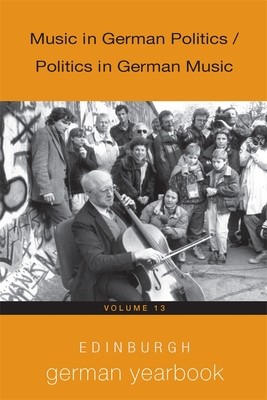
- We will send in 10–14 business days.
- Publisher: Camden House (NY)
- ISBN-10: 1640140603
- ISBN-13: 9781640140608
- Format: 15.2 x 22.9 x 1.3 cm, kieti viršeliai
- Language: English
- SAVE -10% with code: EXTRA
Edinburgh German Yearbook 13 (e-book) (used book) | bookbook.eu
Reviews
Description
Volume 13 deals with the interaction of music and politics, considering a broad range of genres, authors, composers, and artists in Germany since the nineteenth century.
A particularly iconic image of German Reunification is that of Mstislav Rostropovich playing from J. S. Bach's cello suites in front of the Berlin Wall on November 11, 1989. Thirty years on, it is timely to reconsider the cross-fertilization of music and politics within the German-speaking context. Frequently employed as a motivational force, a propaganda tool, or even a weapon, music can imbue a sense of identity and belonging, triggering both comforting and disturbing memories. Playing a key role in the formation of Heimat and "Germanness," it serves ideological, nationalistic, and propagandistic purposes conveying political messages and swaying public opinion.
This volume brings together essays by historians, literary scholars, and musicologists on topics concerning the increasing politicization of music, especially since the nineteenth century. They cover a broad spectrum of genres, musicians, and thinkers, discussing the interplay of music and politics in "classical" and popular music: from the rediscovery and repurposing of Martin Luther in nineteenth-century Germany to the exploitation of music during the Third Reich, from the performative politics of German punk and pop music to the influence of the events of 1988/89 on operatic productions in the former GDR - up to the relevance of Ernst Bloch in our contemporary post-truth society.
EXTRA 10 % discount with code: EXTRA
The promotion ends in 22d.20:51:24
The discount code is valid when purchasing from 10 €. Discounts do not stack.
- Publisher: Camden House (NY)
- ISBN-10: 1640140603
- ISBN-13: 9781640140608
- Format: 15.2 x 22.9 x 1.3 cm, kieti viršeliai
- Language: English English
Volume 13 deals with the interaction of music and politics, considering a broad range of genres, authors, composers, and artists in Germany since the nineteenth century.
A particularly iconic image of German Reunification is that of Mstislav Rostropovich playing from J. S. Bach's cello suites in front of the Berlin Wall on November 11, 1989. Thirty years on, it is timely to reconsider the cross-fertilization of music and politics within the German-speaking context. Frequently employed as a motivational force, a propaganda tool, or even a weapon, music can imbue a sense of identity and belonging, triggering both comforting and disturbing memories. Playing a key role in the formation of Heimat and "Germanness," it serves ideological, nationalistic, and propagandistic purposes conveying political messages and swaying public opinion.
This volume brings together essays by historians, literary scholars, and musicologists on topics concerning the increasing politicization of music, especially since the nineteenth century. They cover a broad spectrum of genres, musicians, and thinkers, discussing the interplay of music and politics in "classical" and popular music: from the rediscovery and repurposing of Martin Luther in nineteenth-century Germany to the exploitation of music during the Third Reich, from the performative politics of German punk and pop music to the influence of the events of 1988/89 on operatic productions in the former GDR - up to the relevance of Ernst Bloch in our contemporary post-truth society.


Reviews